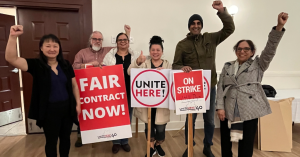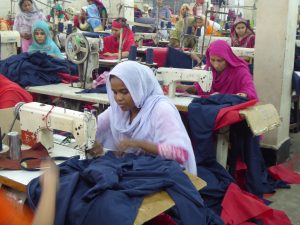工會能幫助改善不穩定的工作嗎?
工會能幫助改善不穩定的工作嗎?
摘錄Laurie Monsebraaten 2013年2月24 日星期日多倫多星報文章
麥馬士打大學( McMaster University) 和多倫多公益金( United Way Toronto) 聯合發表的報告指出,在大多倫多市地區和咸美頓市逐漸增加的非標準工作,引起了公眾就如何最好地支持沒有福利保障的勞工,應對變幻莫測的工作狀況的討論。
「解決的方法不能僅靠提高工作不穩定的工人的工資」,題為《這不僅僅是貧窮:不穩定的工作狀況和家庭幸福》的報告說。
這份報告指出,解決的方法還需要處理工作不穏定和對工作時間表缺乏控制,對人們成家立室、家庭和諧和與社區深入連繫的影響。
烈治文市的電工許尼爾,39歲, 同時在兩種不同的勞工市場工作過。電力工程師的許在2002 年第一次從中國來到加拿大時只能在工廠做中介介紹的臨時工作, 但即使他在2005年取得電工牌照,因缺乏加拿大工作經驗,他還是被大部份的工作拒絕,直至一家僱主給他提供一個月的無薪工作機會。
「公司承諾給我出一封推薦信, 這樣我做了,」許說。之後,許得到的工作大部份是通過臨時中介介紹的,他們僅支付最低工資,沒有健康、牙或眼睛醫療福利,沒有加班費或退休金,沒有安全保障,沒工作時,就沒有工資。很偶然的機會,一名供應商告訴許有關IBEW工會,當他知道工會電工的工資是他的三倍,有福利,好的退休金計劃,以及還有工作保險時, 他非常渴望想加入工會。
很幸運,當時在許工作的地方的其他電工也很有興趣加入工會,一起,他們成功地發起了成立工會。許和他的工友得到了工會會員卡。從此以後,許在大多倫多地區有工會的工作地點安裝照明,他的年收入從$20,000跳到$85,000。每年他至少到工會上兩星期的免費培訓課,以提高資格。
許現在多倫多婦女醫學院工作,醫院提供所有東西,不像其他非工會工作場所,他必須自備工具和車去取材料。
「工資和福利已經在協議裡談好,」他說,「開始時間,中休,午餐和在家時間全在協議裡。當超時工作時,你會得到雙倍的工資。在非工會的地方,如果你超時得到全部支付,那只是按正常工時支付。
工會給許和他的妻子信心有第二個孩子。在2011年,他們買了房子。他們為孩子的教育節省開支,並能夠給他們註冊上游泳課,鋼琴課和運動課。他們還活躍於自己的信仰團體。
「如果你是好工人,不犯錯,態度好,你就會在這一行幹得很好,」他說,「對於新移民, 經常很容易被困在壞的工作,工會是很好的東西。」
工会能帮助改善不稳定的工作吗?
摘录Laurie Monsebraaten 2013年2月24 日星期日多伦多星报文章
麦马士打大学( McMaster University) 和多伦多公益金( United Way Toronto) 联合发表的报告指出,在大多伦多市区和咸美顿市逐渐增加的非标准工作,引起了公众就如何最好地支持没有福利保障的劳工,应对变幻莫测的工作状况的讨论。
「解决的方法不能仅靠提高工作不稳定的工人的工资」,题为《这不仅仅是贫穷:不稳定的工作状况和家庭幸福》的报告说。
这份报告指出,解决的方法还需要处理工作不穏定和对工作时间表缺乏控制,对人们成家立室、家庭和谐和与社区深入连系的影响。
烈治文市的电工许尼尔,39岁, 同时在两种不同的劳工市场工作过。电力工程师的许在2002 年第一次从中国来到加拿大时只能在工厂做中介介绍的临时工作, 但即使他在2005年取得电工牌照,因缺乏加拿大工作经验,他还是被大部分的工作拒绝,直至一家雇主给他提供一个月的无薪工作机会。
「公司承诺给我出一封推荐信, 这样我做了,」许说。之后,许得到的工作大部份是通过临时中介介绍的,他们仅支付最低工资,没有健康、牙或眼睛医疗福利,没有加班费或退休金,没有安全保障,没工作时,就没有工资。很偶然的机会,一名供货商告诉许有关IBEW工会,当他知道工会电工的工资是他的三倍,有福利,好的退休金计划,以及还有工作保险时, 他非常渴望想加入工会。
很幸运,当时在许工作的地方的其他电工也很有兴趣加入工会,一起,他们成功地发起了成立工会。许和他的工友得到了工会会员卡。从此以后,许在大多伦多地区有工会的工作地点安装照明,他的年收入从$20,000跳到$85,000。每年他至少到工会上两星期的免费培训课,以提高资格。
许现在多伦多妇女医学院工作,医院提供所有东西,不像其他非工会工作场所,他必须自备工具和车去取材料。
「工资和福利已经在协议里谈好,」他说,「开始时间,中休,午餐和在家时间全在协议里。当超时工作时,你会得到双倍的工资。在非工会的地方,如果你超时得到全部支付,那只是按正常工时支付。
工会给许和他的妻子信心有第二个孩子。在2011年,他们买了房子。他们为孩子的教育节省开支,并能够给他们注册上游泳课,钢琴课和运动课。他们还活跃于自己的信仰团体。
「如果你是好工人,不犯错,态度好,你就会在这一行干得很好,」他说,「对于新移民, 经常很容易被困在坏的工作,工会是很好的东西。」
Can Unions Help Make Unstable Jobs Better?
Excerpt from article by Laurie Monsebraaten, Toronto Star, Sunday, February 24, 2013; Translated by Heidi Huang
The rise of non-standard work in Greater Toronto and Hamilton calls for public debate on how best to support people working in unpredictable jobs with no benefits or security, says a report by McMaster University and United Way Toronto.
“The solutions are broader than raising the income of precariously employed people,” says the report, titled It’s More than Poverty: Employment Precarity and Household Well-being.
The solutions must also address job uncertainty and the lack of control over work schedules that affect people’s choices to have families, household harmony and the depth of their community connections, the report says.
Richmond Hill electrician Neil Xu, 39, has worked on both sides of the precarious labour market. An electrical engineer by training, Xu could only find temporary agency work as a factory labourer when he first arrived in Canada from China in 2002. But even when he got his electrician’s license in 2005, his lack of Canadian experience barred him from most job sites until one employer offered him a month of volunteer work.
“The company promised to give me a reference letter, so I did it,” says Xu. After that, Xu got most of his work through temporary agencies that paid minimum wage with no health, dental or vision benefits, no overtime or pension. There was no security and when he didn’t work, he didn’t get paid. Quite by chance, a supplier told Xu about IBEW and when he learned that unionized electricians were earning almost three times as much as he was – with benefits, a generous pension plan and an Employment Insurance top-up when they were in between jobs, he was eager to join.
Fortunately, other electrical workers in Xu’s workplace at the time were also interested in joining the union and together they launched a successful union drive. Xu and his co-workers got their union cards. Since then, Xu has installed lighting in unionized jobsites all over the GTA and his annual income has jumped from about $20 000 to about $85 000. Every year he takes at least two free training courses through the union to upgrade his qualifications.
Xu is currently working at Women’s College Hospital. Unlike non-union workplaces where he had to bring his own tools and use his own car to pick up materials, everything is supplied.
“The wages and benefits have already been negotiated,” he says. “The start time, breaks, lunch and home-time are all in the agreement. When you work overtime you are always paid double-time. In non-union places it is straight time, if you get paid at all.”
Membership in the union has given Xu and his wife the confidence to have a second child. In 2011, they bought a house. They are saving for their children’s education and are able to enroll them in swimming, piano lessons and sports. They are also active in their local faith community.
“If you are a decent worker, make no mistakes and have a good attitude, you can do very well in this industry,” he says. “For newcomers, who often get stunk in bad jobs, unions are a very good thing.”




